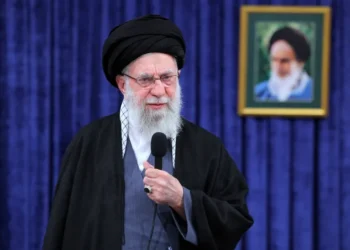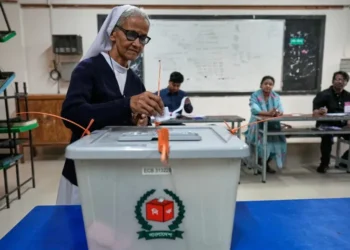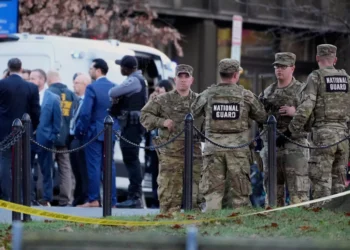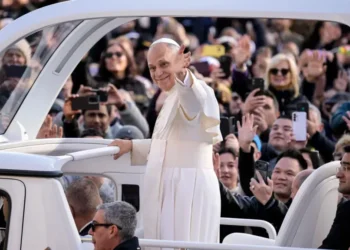Trump Seeks to Designate Drug Cartels as Foreign Terrorist Organizations
President Donald Trump has announced plans to designate drug cartels as foreign terrorist organizations, signing an executive order on Monday aimed at escalating efforts to combat these groups. The move is expected to intensify a militarized approach to U.S. border policies and relations with Latin America.
Key Focus on Latin American Cartels
The order specifically highlights the threats posed by Mexican drug cartels and other criminal organizations such as Venezuela’s Tren de Aragua and El Salvador’s Mara Salvatrucha (MS-13). These groups, the order states, “threaten the safety of the American people, the security of the United States, and the stability of the international order in the Western Hemisphere.”
While no organizations were explicitly named in the order, Cabinet secretaries have been tasked with recommending groups for designation within 14 days.
Violence, Drugs, and National Security
The order emphasizes the cartels’ role in destabilizing Latin American nations and flooding the U.S. with drugs, violent criminals, and gangs. Trump’s administration has framed the issue as a direct threat to U.S. national security, although the specific impact on counter-cartel efforts remains unclear. Critics worry that this step could complicate access to asylum for individuals from affected regions.
Expanded Measures on Immigration and Border Security
This executive order adds to a series of controversial immigration and border security actions by Trump, including:
- Declaring an emergency on the southern border.
- Threatening to impose 25% tariffs on Mexico and Canada by February 1.
- Ending the use of the CBP One app, which allowed migrants to apply for asylum appointments before reaching the U.S. border.
Trump has also proposed mass deportations and even military intervention in Mexico, a suggestion strongly opposed by Mexican President Claudia Sheinbaum.
Impact on Migrants and Asylum Seekers
Designating cartels as terrorist organizations could complicate migration further. According to Vanda Felbab-Brown, a Brookings Institution expert on organized crime, the move could disqualify many asylum seekers. Migrants often pay cartels to cross through Mexico or other countries, which could now be seen as material support for terrorism under U.S. law.
“Trump can essentially prevent the vast majority of undocumented migrants trying to cross the U.S. border from getting asylum,” Felbab-Brown explained.
Critics Call It ‘Political Theater’
Some experts believe the designation will have limited practical impact. Mike Vigil, former head of the DEA’s foreign operations, dismissed the move as largely symbolic.
“It’s already been done. This is nothing new,” said Vigil. “It’s all political theater and tossing a piece of stale salami to his base.”
While the order might enable the U.S. to freeze assets, sanction U.S. citizens working with cartels, and block members of designated groups from entering the country, Vigil clarified that it doesn’t authorize U.S. military intervention in Mexico. “Mexico is a sovereign country, and that would be an act of war,” he added.
Rising Violence in Mexico
The move comes as cartel-related violence has surged, particularly in northern Mexico. The detention of kingpin Ismael “El Mayo” Zambada has triggered violent infighting within the Sinaloa cartel. Mutilated bodies have been found, and kidnappings—including from hospitals—are on the rise.
Cartels have also embraced advanced tactics, deploying drones, IEDs, and armored vehicles, while diversifying into new areas like migrant trafficking and even the avocado trade. Tragically, thousands of Mexican citizens have been killed or disappeared in the crossfire.
Hopes for Justice Among Victims’ Families
Some victims’ families in Mexico see the designation as a potential step toward justice. Adrián LeBarón, whose daughter was killed in a 2019 massacre, welcomed the move.
LeBarón, who has described the attack as terrorism, said it could pressure authorities to hold perpetrators accountable and raise awareness about violence in Mexico.
“An investigation into terrorism is justice not only for us but also for every town and corner of the country where a family has been destroyed and terror is sown in its wake,” he wrote on X.
Conclusion
While the designation of drug cartels as terrorist organizations could symbolize a stronger stance against crime and violence, its practical implications remain uncertain. Critics and experts are divided on whether it will lead to meaningful change or serve primarily as political posturing. Meanwhile, the families of victims continue to hope for justice in one of the world’s most violence-stricken regions.
This article was rewritten by JournosNews.com based on verified reporting from trusted sources. The content has been independently reviewed, fact-checked, and edited for accuracy, neutrality, tone, and global readability in accordance with Google News and AdSense standards.
All opinions, quotes, or statements from contributors, experts, or sourced organizations do not necessarily reflect the views of JournosNews.com. JournosNews.com maintains full editorial independence from any external funders, sponsors, or organizations.
Stay informed with JournosNews.com — your trusted source for verified global reporting and in-depth analysis. Follow us on Google News, BlueSky, and X for real-time updates.














